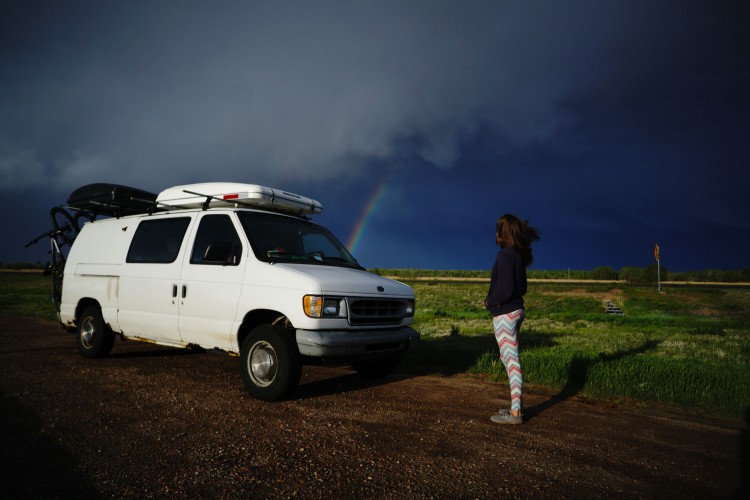What Doesn’t Kill You…
11 May 2016
Makes you stronger??? Or, you know, not.

The last month has been rough. Like, seriously, I don’t know what I did to piss April off, but it certainly retaliated with a vengeance. My bike got stolen. I got a cold. I randomly broke out in hives. I was basically unable to ride my bike for the entire month due to a re-occurring knee injury that has been bothering me for over a year now. And because of that, I had to pull out of the Enduro Cup in Moab, which was one of my favorite races last year.
And those were the things that I had no control over. I also did a terrible job with the one thing I could control — my attitude. Basically, I’ve spent the past three weeks walking around like the sky was crashing around my ears. I’m not going to say that this was entirely unjustified, as it’s really shitty when all your plans for your *perfect* season suddenly go up in flames, but it certainly wasn’t helpful, or productive, or nice for the people who had to put up with me. (Sorry, Macky.)
The problem is — I hate hate HATE these kind of injuries. I wouldn’t say I’m great at dealing with any type of injury (what athlete is?), but outside of anything seriously life-threatening, nagging, long-term, inexplicable injuries are the WORST. And I know, because I’ve had a lot of them. There is something about an injury with no discernible cause and no timeline that is just frustrating, infuriating and, oddly enough, kind of embarrassing. Embarrassing because when your knee hurts for no reason it’s hard to not feel like there’s something wrong with you. Especially when, ostensibly, you’re doing everything right. I’ve seen three physical therapists in the past year. I’ve seen an osteopath and an orthopaedic surgeon. I’m not overtraining. I stretch, I ice, I heat, I tape. I’ve done yoga and strength training. For what it’s worth, I’ve gotten about 100 times stronger since this problem started. And yes, since everyone and their mother feels the need to suggest this, I use arnica. (I swear, if you show up to a bike race with an amputated limb, someone will tell you to put arnica on it. For f&*k’s sake, people, give it a rest with the arnica.)
The one thing I haven’t done — and this is entirely on me — is listen to my body. I am far too good at riding, training and racing through pain. I don’t trust my own pain signals unless they are so bad that I can’t get out of bed. If I had a dollar for every time I’ve said something along the lines of “it doesn’t feel good, but I don’t think I’d call it pain” or “yeah, I guess it hurts, but it’s not really pain” in the past year, I’d be a rich woman. I honestly don’t know what I thought pain was. Guys, the purpose of pain in your body is not to cripple you. It’s a message. It’s trying to tell you something and that something is almost always YOU’RE DOING SOMETHING WRONG, ASSHOLE.
But what about “no pain, no gain,” you say. What about “what doesn’t kill you, makes you stronger.” Doesn’t pain make you tough? Isn’t being an athlete supposed to hurt? As a high school athlete, I was in pain for four solid years. I walked up stairs backwards for my entire track and cross country seasons because my calves were so sore, and I thought that was entirely normal — good, even. I was told that meant I had crushed a workout, that I was tough, that I was doing something right. And you know what? It did make me tough. It also made me slow. You don’t get faster when you’re training through pain. You just don’t. It’s stupid. I didn’t know better then, but now I do, so there’s really no excuse. The saying should be “no gain with pain,” because what doesn’t kill you, often makes you slow and tired frustrated and PISSED OFF.
I really didn’t want to write this post, but I’m doing it anyway, because I think it’s important. While I’m comfortable talking about my bad race results and my crashes and my insecurities on this blog, talking about injuries makes me feel horribly, horribly vulnerable. It makes me feel weak, which is ironic, because it was my fear of appearing weak that led me to ignore these underlying issues for far too long. Nobody wants to be the kid who’s always pulling out of races for some mysterious, undiagnosed, largely-invisible problem. It sucks. But as a professional athlete, or a blogger, or really anyone who vomits their entire life onto the internet — you don’t get to just slink away and pretend like everything’s hunky-dory. You can’t. You can’t hide on race day, either. You have to get out there and take pictures and be supportive and answer everyone’s questions about why you’re not racing, because, unless you’re on life support, it’s your goddamn job to be there. And, honestly, that sucks. Last weekend sucked. I did everything I could to try to be decent race support for Macky, and I’m immensely proud of him for his awesome result, but it still kind of sucked.
The good news, of course, is that I will be fine. I think I’m getting to the root of the problem, and while it will take some patience, and while I certainly wouldn’t have chosen to deal with this *now*, I will be better off for dealing with it. Oh and it won’t kill me. It might even make me stronger.
But, here’s the important bit — it’s not the pain that’s going to make me stronger. In fact, it’s kind of the opposite. It’s the willingness to admit weakness, to slow down, to relearn basic things and take the time to build better foundations. That — that’s what will make me stronger. Ultimately, ignoring pain is easy. Acknowledging it, fixing it — that makes you tough.






Hi, Sister! I’m a retired (long ago) pro mountain bike racer, and I get this…all of it. I had a re-occurring knee injury that came and went after a bad crash. Like you, it drove me mad. I didn’t deal with it well–at all. My ultimate diagnosis was chondromalacia, and it takes a genius of a physical therapist to help with that recovery. I made it–all the way back–to racing my bike.
I now coach injured athletes–think life coach specific to the needs of injured athletes.
Using more than ten years of personal injury experience and data from several hundred hours of research, I teach the essential tools for recovery. These tools help injured athletes move from feeling frustrated, impatient, and angry to feeling optimistic, patient, and motivated.
My website is full of information and blogs that can help you along on your recovery.
1) The “Sound Familiar” page includes the top challenges injured athletes face and how to overcome them: http://injuredathletestoolbox.com/sound-familiar/
2) The “The Road Back” page includes strategies athletes have used to come through their injury with resilience, ultimately leading them to say, “While my injury was difficult, it made me a better person and athlete, and I’m thankful for it.” http://injuredathletestoolbox.com/the-road-back/
3) My blog has all kinds of good information and tips for helping yourself along the mental minefield of injury: http://injuredathletestoolbox.com/blog/
Remember:
1) You are NOT alone
2) It gets better.
I don’t know you, but I’m sending you a hug anyway…because we are all connected.
Forward…
Heidi Armstrong
injuredathletestoolbox.com
Thank you taking the time to leave such a sweet comment. Hug totally accepted. I will check out your site — looks like a really fantastic resource.
Pingback: Treating Injury as a Growth Experience - Syd Schulz
Pingback: When You're Tough Enough - Syd Schulz